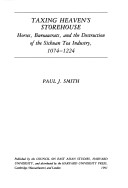Harvard-Yenching Institute Monograph
1 primary work
Book 32
Tea-growing was a prosperous industry in Sichuan when Wang Anshi's New Policies created a Tea and Horse Agency to buy up Sichuanese tea and trade it to Tibetan tribesmen for cavalry horses. At first the highly autonomous Agency not only acquired the needed horses but made a profit. After the Jurchen conquest of North China, however, market realities changed and the Agency's once-successful policies ruined tea farmers, failed to meet quotas for horses, and ran a deficit. The Agency made entrepreneurs out of bureaucrats but ultimately became ruinously tyrannical as the system of state rewards and punishments drove its personnel to actions that crippled key sectors of the economy. In this study of fiscal sociology, Smith explains how the new Tea and Horse Agency transformed the Sichuan local elite into imperial civil servants eager to tax their own region, and explains other results of its exercise of aggressive bureaucratic control during the Song.
